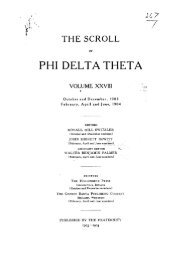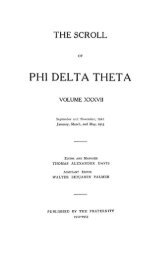1998 Volume 121 No 1–4 - Phi Delta Theta Scroll Archive
1998 Volume 121 No 1–4 - Phi Delta Theta Scroll Archive
1998 Volume 121 No 1–4 - Phi Delta Theta Scroll Archive
Create successful ePaper yourself
Turn your PDF publications into a flip-book with our unique Google optimized e-Paper software.
THE CARDINAL PRINCIPLES<br />
What does our word mean<br />
By Rev. David Turner, O.S.B.<br />
Editor's note: One of the goals of General Council President<br />
Robert Deloian is to return to the Fraternity's founding principles.<br />
With that in mind, we thought it appropriate to ask Fr.<br />
David Turner, Minnesota '70, a former General Council member<br />
and chaplain of Benedictine University, to begin a series of columns<br />
on living our principles. Fr. Turner welcomes comments<br />
from readers. Write him at Benedictine University, 5700 College<br />
Road, Lisle Illinois 60532-0900 or e-mail: dturner@ben.edu.<br />
"Let your signature to The Bond..." There<br />
comes that point in our initiation ceremony<br />
where the presiding officer invites us to sign<br />
The Bond of the <strong>Phi</strong> <strong>Delta</strong> <strong>Theta</strong>. What does that<br />
action mean to most people today Or, for that<br />
matter, let me ask that same question I once<br />
asked a group of fraternity men sitting before<br />
me, "What is the value of your word Does giving<br />
your word mean anything in today's<br />
world"<br />
The scene was a disciplinary hearing. I was<br />
the chairman of the board of fraternity affairs.<br />
Sitting with me on the disciplinary committee<br />
were officers of the IFC and other board members:<br />
a lawyer from town, a businessman, an administrator<br />
from the university's fund raising staff The issue involved was<br />
hazing. What added to the problem was the fact that all of the<br />
men sitting before me had put their signatures to a document<br />
developed by the dean of fraternities that each chapter on<br />
campus was to sign. The officers each signed a statement indicating<br />
that they themselves would not haze nor would they<br />
allow others in their chapters to haze. This scenario is only a<br />
small sample of what appears to be a developing behavioral<br />
problem in today's world: the value or the trustworthiness of<br />
one's word.<br />
Already in the ancient world, as we can see from accounts<br />
recorded in the Hebrew Scriptures, there was the issue of a<br />
person giving "testimony," swearing that what was said was the<br />
truth. The oath called upon God as a witness: "What I say is<br />
the truth, the whole truth, and nothing but the truth, so help<br />
me God." Perhaps the fact that I hear students on my own<br />
campus punctuate their conversations with each other with "I<br />
swear to God" when no "swearing" is either needed or appropriate<br />
may be reason enough for us to look at ourselves, at our<br />
observable behaviors, and question what it is that we do and<br />
say. We can look at many of our past actions and seriously ask<br />
ourselves, "Is the fact that my signature is appended to a copy<br />
of The Bond something I take seriously" What is the value of<br />
my word<br />
Back in 1996 when The <strong>Scroll</strong> editor asked me to give<br />
thought to writing this series of articles, he sent me a photocopy<br />
of a piece that appeared in the December 8th issue of<br />
The Cincinnati Enquirer where the headline read: "Poll: Everyone<br />
else is lying." Julie Irwin, a writer for that paper reported<br />
on studies made by a Los Angeles-based ethics institute which<br />
found that 57 percent of young people reported they had<br />
cheated on an exam in the previous year, though over 85 percent<br />
said such cheating was wrong! Do ideals match behavior<br />
Are we "walking the talk"<br />
The poll reported other findings: 23 percent said they would<br />
He about their children's ages to save $20 on admission<br />
to an amusement park; 17 percent said<br />
they would hide previous injuries on an application<br />
for health insurance to save at least $50 on<br />
monthly premiums; if their classmates had obtained<br />
the answers to an exam worth 50 percent<br />
of the final grade, 12 percent said they would<br />
cheat on the exam.<br />
I'm really back to my fundamental question:<br />
"What is the value of a person's word today" If<br />
we look up the word "bond" in, say, The Unabridged<br />
Edition of the Random House Dictionary<br />
of the English Language we would find the<br />
statement "My word is my bond," indicating the "firm assurance"<br />
that a listener should know what one says is the truth.<br />
During this <strong>1998</strong> spring semester, I am teaching a course in<br />
research writings in the social sciences. During the past week<br />
(as I am writing this) we discussed the issue of critiquing<br />
sources of evidence. The author gave an example of research<br />
which demonstrated that people wanted "violent news." It was<br />
discovered that news directors put on the air "what people<br />
want and demand." Should we ask why all the "news" about<br />
President Clinton during the first week of February took up so<br />
much of the program's time Is there any point of expecting<br />
the "truth" Is there any evidence that people take oaths seriously<br />
Perhaps by the time of the printing of this article all the<br />
flap may be over. But what does this teach us The desire of a<br />
news person to "make it first"<br />
To be the one who "cracked the scoop"<br />
I recall how months prior to the death of Cardinal Joseph<br />
Bernardin of Chicago, when he was accused of sexual misconduct,<br />
(which was recanted later by the accuser), the news crews<br />
literally camped outside his house waiting for opportunities to<br />
ask their questions. Are we nothing more than a world of voyeurs,<br />
people waiting to see the supposed or alleged wrongdoing<br />
of others<br />
William H. Willimon and Thomas H. Naylor wrote a book<br />
published back in 1995 titled The Abandoned Generation.<br />
Willimon, a member of Pi Kappa Alpha, is currently the dean<br />
of chapel and professor of Christian ministry at Duke Univerhttp://www.phidelt-ghq.<br />
com THE SCROLL WINTER <strong>1998</strong>

















